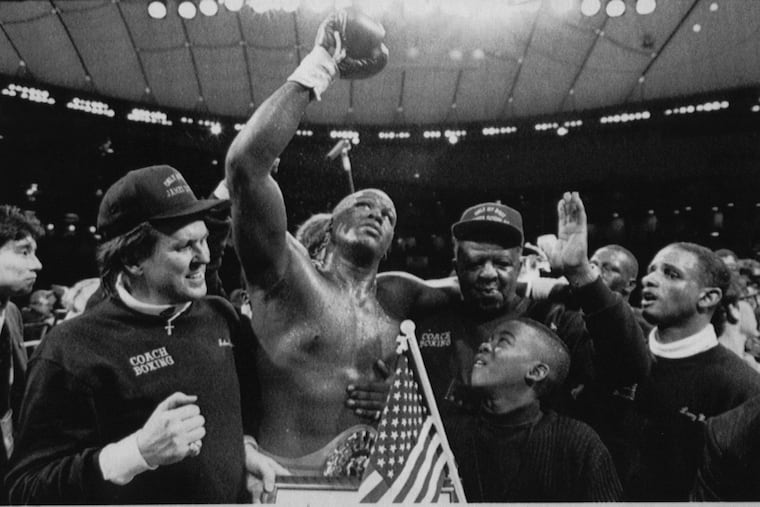An ode to HBO boxing as it throws in the towel
After 2018, HBO will no longer feature live boxing.

It's a hell of a thing to watch a man transcend the limits of his talent, to take a lifetime of dreams and disappointments, the 42-1 odds against him, and bind them into something perfect.
The uppercut, summoned deep from the basement of James "Buster" Douglas's heavy heart.
Then a quick right-left-right-left combo.
The impossible.
"Mike Tyson has been knocked out," HBO ringside commentator Jim Lampley said that Sunday morning in Japan.
HBO reigns supreme among my peers. The Sopranos? What an ending. Game of Thrones and The Wire? Never saw either, but I sure hear about them. Shows come and go. I get it. I watched every episode of John from Cincinnati.
Boxing is why I subscribe to HBO. The network did more for boxing, way more, than any other network. The rest of HBO was just a bonus.
On Thursday, I saw a post in a Facebook boxing group about HBO giving up on the sport. I laughed, of course. Then I got nervous and searched Google.
"Going forward in 2019, we will be pivoting away from programming live boxing on HBO. As always, we will remain open to looking at events that fit our programming mix," the network said in a statement.
I mourned with a friend and fellow fan in text messages.
"Bad sign," he said.
HBO has been airing boxing for 45 years, hundreds of elite fights, with a ringside crew that's been around nearly as long. The network noted that boxing is available more than ever, on a "host of networks and streaming services."
"In some cases, this programming is very good. But from an entertainment point of view, it's not unique," the network said.
According to a New York Times story on the decision, Lampley would be the only member of HBO's boxing crew, which includes ESPN's Max Kellerman and former champion Roy Jones Jr., who would stay on. In a statement, Lampley told me he would continue to "support storytelling initiatives in the sports department."
Larry Merchant, a former sports editor of the Daily News, retired from HBO boxing in 2012 after decades along the ring. Now 87, Merchant said boxing helped build HBO into a powerhouse.
"Personally, it saddens me," Merchant said. "It's like the end of a champion's career, the full arc of a fighter."
Someone must have crunched some numbers, Merchant said, and the sweet science didn't make the cut.
"They don't have a passion for the sport. Once it was used as programming that would make the network more popular and be a part of its programming and sell subscriptions," Merchant added. "I guess they don't think it does that anymore so it's time to close the show."
HBO used the word "storytelling" in its own statement, too, as it looked forward. The network talked about its commitment to "unscripted series" such as "The Shop with LeBron James and "Being Serena."
"This could include boxing, just not for the foreseeable future," HBO said.
Thursday's news took me back to that Sunday morning in Japan, and my parents' basement 6,700 miles away in South Jersey, where it was still Saturday night. I was 12 on Feb. 11, 1990, sitting cross-legged, inches from the bulky, cathode-ray television.
The Japanese crowd was being polite, or perhaps just speechless. but the silence made the fight more visceral. The sound of Douglas's sharp jabs, of Tyson's corner begging him to right the ship, came in clear through that tiny speaker.
Douglas was chopping down the most invincible man I'd ever seen in sports. When it ended, I screamed "Oh my God" all through the house and there was no one to text, no reaction to share on Twitter or Facebook. It was mine alone, the only kid in the world watching that fight, not rooting for one over the other. Just grateful, almost joyous, that I'd seen it.
"I would be willing to say it's the greatest upset in boxing history," Merchant said seconds after the knockout.
Merchant made his way into the ring, to Douglas, a man whose beloved mother, Lula Pearl, had died weeks before the fight; whose father said he wasn't violent enough; whose toughest opponent had long been himself.
"Why did you win this fight that no one on the planet gave you a shot …," Merchant asked.
Douglas, overcome with emotion, interrupted him.
"My mother, my mother."
Merchant draped a hand on Douglas's shoulder. He gave the man time to take it all in, to know he'd been the best version of himself that morning in Japan, and together they talked about boxing for several minutes while his team fastened the belt around his waist.
Critics said it was Merchant's finest interview. He agrees. I concur. It's an unscripted drama burned into my boyhood memory, storytelling at its finest, what I long for as a journalist, and its sad to see HBO let it go.
"It was just a fight until it wasn't. It's the culmination of what we did there," Merchant told me. "That, to me, is the narrative of a fight, the theater of the unexpected."